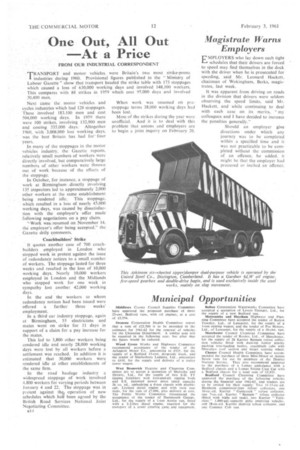One Out, All Out At a Price
Page 48

If you've noticed an error in this article please click here to report it so we can fix it.
FROM OUR INDUSTRIAL CORRESPONDENT 'TRANSPORT and motor vehicles were Britain's two most strike-prone -I. industries during 1960. Provisional figures published in the " Ministry of Labour Gazette" show that transport headed the strike table with 173 stoppages which caused a loss of 630,000 working days and involved 148,100 workers. This compares with 88 strikes in 1959 which cost 95,000 days and involved 30,400 men.
Next came the motor vehicles and cycles industries which had 128 stoppages, These involved 183,100 men and cost 504,000 working days. In 1959 there were 100 strikes, involving 132,900 men and costing 335,000 days. Altogether 1960, with 3,008,000 lost working days, was the best Britain has had for four years.
In many of the stoppages in the motor vehicles industry, the Gazette reports, relatively small numbers of workers were directly involved, but comparatively large numbers of other workers were thrown out of work because of the effects of the stoppage. In October, for instance, a stoppage of work at Birmingham ..directly involving 135 inspectors led to approximately 2,000 other workers at the same establishment being rendered idle. • This • stoppage, which resulted in a loss of nearly 45,000 working days, was caused by dissatisfaction with the employer's offer made following negotiations on a pay claim.
was .resumed on November 14, the employer's offer being accepted." the Gazette drily comments.
Coachbuilders' Strike It quotes another case of 700 coachbuilders employed in London who stopped work in protest against the issue of redundancy notices to a small number of Workers. The stoppage lasted for three weeks and resulted in the loss of 10,000 working days. Nearly 10,000 workers employed in London and the Midlands who stopped work for one week in sympathy lost another 42,000 working days.
In the end the Workers to whom redundancy notices had been issued were offered a further three weeks' employment.
In a third car industry stoppage, again at Birmingham, 55 electricians and mates went on strike for 11 days in support of a claim for a pay increase for the mates.
This led to 3,800 other workers being rendered idle and nearly 28,000 working days were lost by all workers before a settlement was reached. In addition it is estimated that 30,000 workers were rendered idle at other establishments of the same firm.
In the road haulage industry a widespread stoppage of work involved 4,800 workers for varying periods between January 4 and 22. The stoppage was in protest against thil. operation of new schedules which hats been agreed by the British Road Services National Joint Negotiating Committee.
When work was resumed on prestoppage terms 38,000 working days had been lost.
Most of the strikes during the year were unofficial. And it is to deal with this problem that unions and employers are to begin a Joint inquiry on February 20,
































































































































